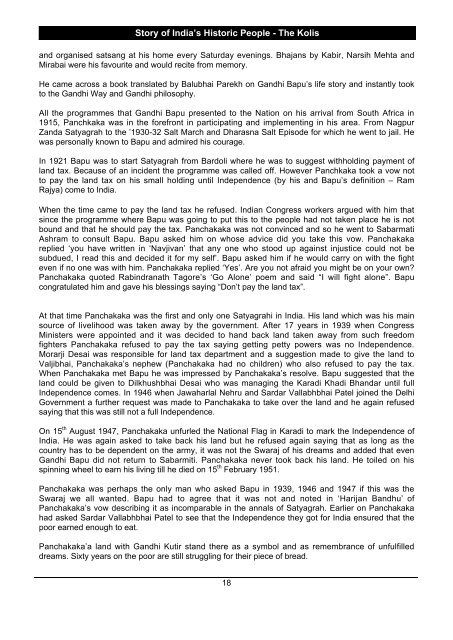THE ASSOCIATION OF MANDHATA SAMAJ UK - Mandhata Global
THE ASSOCIATION OF MANDHATA SAMAJ UK - Mandhata Global
THE ASSOCIATION OF MANDHATA SAMAJ UK - Mandhata Global
Create successful ePaper yourself
Turn your PDF publications into a flip-book with our unique Google optimized e-Paper software.
Story of India’s Historic People - The Kolis<br />
and organised satsang at his home every Saturday evenings. Bhajans by Kabir, Narsih Mehta and<br />
Mirabai were his favourite and would recite from memory.<br />
He came across a book translated by Balubhai Parekh on Gandhi Bapu’s life story and instantly took<br />
to the Gandhi Way and Gandhi philosophy.<br />
All the programmes that Gandhi Bapu presented to the Nation on his arrival from South Africa in<br />
1915, Panchkaka was in the forefront in participating and implementing in his area. From Nagpur<br />
Zanda Satyagrah to the ’1930-32 Salt March and Dharasna Salt Episode for which he went to jail. He<br />
was personally known to Bapu and admired his courage.<br />
In 1921 Bapu was to start Satyagrah from Bardoli where he was to suggest withholding payment of<br />
land tax. Because of an incident the programme was called off. However Panchkaka took a vow not<br />
to pay the land tax on his small holding until Independence (by his and Bapu’s definition – Ram<br />
Rajya) come to India.<br />
When the time came to pay the land tax he refused. Indian Congress workers argued with him that<br />
since the programme where Bapu was going to put this to the people had not taken place he is not<br />
bound and that he should pay the tax. Panchakaka was not convinced and so he went to Sabarmati<br />
Ashram to consult Bapu. Bapu asked him on whose advice did you take this vow. Panchakaka<br />
replied ‘you have written in ‘Navjivan’ that any one who stood up against injustice could not be<br />
subdued, I read this and decided it for my self’. Bapu asked him if he would carry on with the fight<br />
even if no one was with him. Panchakaka replied ‘Yes’. Are you not afraid you might be on your own?<br />
Panchakaka quoted Rabindranath Tagore’s ‘Go Alone’ poem and said “I will fight alone”. Bapu<br />
congratulated him and gave his blessings saying “Don’t pay the land tax”.<br />
At that time Panchakaka was the first and only one Satyagrahi in India. His land which was his main<br />
source of livelihood was taken away by the government. After 17 years in 1939 when Congress<br />
Ministers were appointed and it was decided to hand back land taken away from such freedom<br />
fighters Panchakaka refused to pay the tax saying getting petty powers was no Independence.<br />
Morarji Desai was responsible for land tax department and a suggestion made to give the land to<br />
Valjibhai, Panchakaka’s nephew (Panchakaka had no children) who also refused to pay the tax.<br />
When Panchakaka met Bapu he was impressed by Panchakaka’s resolve. Bapu suggested that the<br />
land could be given to Dilkhushbhai Desai who was managing the Karadi Khadi Bhandar until full<br />
Independence comes. In 1946 when Jawaharlal Nehru and Sardar Vallabhbhai Patel joined the Delhi<br />
Government a further request was made to Panchakaka to take over the land and he again refused<br />
saying that this was still not a full Independence.<br />
On 15 th August 1947, Panchakaka unfurled the National Flag in Karadi to mark the Independence of<br />
India. He was again asked to take back his land but he refused again saying that as long as the<br />
country has to be dependent on the army, it was not the Swaraj of his dreams and added that even<br />
Gandhi Bapu did not return to Sabarmiti. Panchakaka never took back his land. He toiled on his<br />
spinning wheel to earn his living till he died on 15 th February 1951.<br />
Panchakaka was perhaps the only man who asked Bapu in 1939, 1946 and 1947 if this was the<br />
Swaraj we all wanted. Bapu had to agree that it was not and noted in ‘Harijan Bandhu’ of<br />
Panchakaka’s vow describing it as incomparable in the annals of Satyagrah. Earlier on Panchakaka<br />
had asked Sardar Vallabhbhai Patel to see that the Independence they got for India ensured that the<br />
poor earned enough to eat.<br />
Panchakaka’a land with Gandhi Kutir stand there as a symbol and as remembrance of unfulfilled<br />
dreams. Sixty years on the poor are still struggling for their piece of bread.<br />
18

















